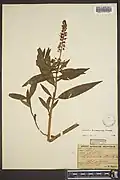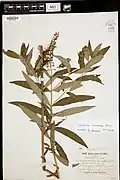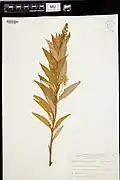Lysimachia × commixta
Lysimachia × commixta is a hybrid of flowering plants in the primrose family Primulaceae.[1] It is native to eastern North America, from eastern Canada across the Great Lakes region west to Minnesota.[2] The hybrid specific epithet commixta means "mixed together, mixed up",[3] which presumably refers to the genetic mixing of two species. Indeed, the hybrid is sometimes referred to as the mixed loosestrife or the commingling loosestrife.[4][5]
| Lysimachia × commixta | |
|---|---|
| Scientific classification | |
| Kingdom: | Plantae |
| Clade: | Tracheophytes |
| Clade: | Angiosperms |
| Clade: | Eudicots |
| Clade: | Asterids |
| Order: | Ericales |
| Family: | Primulaceae |
| Genus: | Lysimachia |
| Species: | L. × commixta |
| Binomial name | |
| Lysimachia × commixta | |
Description
The parents of Lysimachia × commixta are L. terrestris and L. thyrsiflora. The hybrid has a terminal raceme subtended by similar lateral racemes. Vigorous individuals have additional axillary racemes up to 6 cm (2.4 in) long. Although it shows a floral morphology approaching L. thyrsiflora, the hybrid is often confused with L. terrestris, which also has a terminal raceme. The length of the terminal raceme, the length of its pedicel, and the length of the filaments may be used to distinguish L. terrestris from L. × commixta.
| L. terrestris[6] | Lysimachia × commixta[2] | L. thyrsiflora[7] | |
|---|---|---|---|
| Leaves | Opposite or subopposite (rarely alternate); 3 to 10 cm (1.2 to 3.9 in) long and 0.5 to 2 cm (0.2 to 0.8 in) wide | Alternate or subopposite; 5 to 12 cm (2.0 to 4.7 in) long and 1.3 to 4 cm (0.5 to 1.6 in) wide | Opposite to subopposite or whorled; 5 to 16 cm (2.0 to 6.3 in) long and 0.5 to 6 cm (0.2 to 2.4 in) wide |
| Inflorescence | Terminal raceme, 10 to 30 cm (3.9 to 11.8 in) long | Terminal raceme and (usually) one or more axillary racemes, up to 6 cm (2.4 in) long | Axillary racemes, 1 to 3 cm (0.4 to 1.2 in) long |
| Pedicels | From 5 to 16 mm (0.2 to 0.6 in) long | From 3 to 6 mm (0.1 to 0.2 in) long | From 1 to 4 mm (0.0 to 0.2 in) long |
| Flowers | 5-merous | (4-)5(-9)-merous | 5-7(-9)-merous |
| Perianth | Petals yellow, with dark streaks | Petals cream-yellow, with dark streaks | Petals cream-yellow, dark streaked or dotted |
| Stamens | Filaments fused, 1 to 3.5 mm (0.0 to 0.1 in) long, shorter than the petals | Filaments distinct, 3.5 to 7 mm (0.1 to 0.3 in) long, as long as or slightly longer than the petals | Filaments distinct, 4 to 5 mm (0.2 to 0.2 in) long, nearly twice as long as the petals |
Taxonomy
Lysimachia × commixta was first collected (as L. terrestris) by H. Eggert in 1878 in St. Clair County, Illinois.[2] It was described by Merritt Lyndon Fernald in 1950 based on an earlier report by Fernald and Karl McKay Wiegand published in 1910.[8][9] However, Fernald did not provide a Latin description of the hybrid and so technically the name is invalid.[10]
 Specimen collected by Eggert in Illinois in 1875
Specimen collected by Eggert in Illinois in 1875 Specimen collected by Knowlton in Vermont in 1938
Specimen collected by Knowlton in Vermont in 1938 Specimen collected by Gravel and Tessier in Quebec in 1969
Specimen collected by Gravel and Tessier in Quebec in 1969
Distribution
The distribution of Lysimachia × commixta coincides with that of its parents. The hybrid ranges from eastern Canada, across New England, New York, and the Great Lakes region, extending as far west as Minnesota.[2][11]
Lysimachia × commixta is local in distribution.[12] The parents may or may not be found in the vicinity of hybrid populations. For example, the populations in St. Clair County, Illinois, discovered by Eggert in 1878, appear to be extra-parental in range. The hybrid's expansion into southern Illinois is thought to be a result of vegetative propagation along the Mississippi River lowlands.[2]
References
- "Lysimachia × commixta Fernald". Plants of the World Online. Royal Botanic Gardens, Kew. Retrieved 1 August 2021.
- Ray, Jr., James Davis (1956). The genus Lysimachia in the New World. Illinois Biological Monographs: Volume XXIV, Nos. 3-4. Urbana: The University of Illinois Press. pp. 89–92. Retrieved 26 July 2021.
- Gledhill, David (2008). The Names of Plants (4th ed.). Cambridge University Press. p. 116. ISBN 978-0-521-86645-3.
- "Plant Checklist - November 2013" (PDF). Minnesota Department of Natural Resources. Retrieved 11 August 2021.
- "Lysimachia terrestris × L. thyrsiflora". New York Flora Atlas. Retrieved 2 August 2021.
- Cholewa, Anita F. (2009). "Lysimachia terrestris". In Flora of North America Editorial Committee (ed.). Flora of North America North of Mexico (FNA). Vol. 8. New York and Oxford: Oxford University Press. Retrieved 8 August 2021 – via eFloras.org, Missouri Botanical Garden, St. Louis, MO & Harvard University Herbaria, Cambridge, MA.
- Cholewa, Anita F. (2009). "Lysimachia thyrsiflora". In Flora of North America Editorial Committee (ed.). Flora of North America North of Mexico (FNA). Vol. 8. New York and Oxford: Oxford University Press. Retrieved 8 August 2021 – via eFloras.org, Missouri Botanical Garden, St. Louis, MO & Harvard University Herbaria, Cambridge, MA.
- Fernald, M. L. (August 1950). "The hybrid of Lysimachia terrestris and L. thyrsiflora". Rhodora. 52 (620): 199–201. Retrieved 1 August 2021.
- Fernald, M. L.; Wiegand, K. M. (July 1910). "Lysimachia terrestris × thyrsiflora". Rhodora. 12 (139): 141. Retrieved 1 August 2021.
- "Lysimachia × commixta Fernald". International Plant Names Index (IPNI). Royal Botanic Gardens, Kew; Harvard University Herbaria & Libraries; Australian National Botanic Gardens. Retrieved 1 August 2021.
- "Lysimachia X commixta". State-level distribution map from the North American Plant Atlas (NAPA). Biota of North America Program (BONAP). 2014. Retrieved 2 August 2021.
- "Lysimachia X commixta". County-level distribution map from the North American Plant Atlas (NAPA). Biota of North America Program (BONAP). 2014. Retrieved 2 August 2021.
External links
- "Lysimachia × commixta". Illinois Plants. Retrieved 1 August 2021.
- Seymour, Frank Conkling (1982). The Flora of New England. Phytologia Memoirs V. pp. 436–438. Retrieved 8 August 2021.
- Mohlenbrock, Robert H. (2013). Vascular Flora of Illinois: A Field Guide (4th ed.). p. 296. Retrieved 8 August 2021.
- "Lysimachia × commixta Fernald". Flora of Wisconsin. Retrieved 8 August 2021.